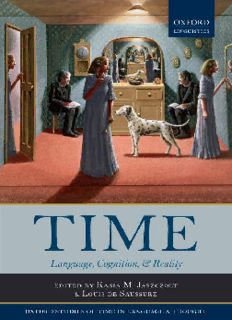Table Of ContentTime
OXFORD STUDIES OF TIME IN LANGUAGE AND THOUGHT
general editors: Kasia M. Jaszczolt, University of Cambridge and Louis de
Saussure,UniversityofNeuchâtel.
advisoryeditors:NicholasAsher,UniversitéPaulSabatier,Toulouse,Johanvan
derAuwera,UniversityofAntwerp,RobertI.Binnick,UniversityofToronto,Ronny
Boogaart,UniversityofLeiden,FrankBrisard,UniversityofAntwerp,PatrickCau-
dal,CNRS,AnastasiaGiannakidou,UniversityofChicago,HansKronning,Univer-
sity of Uppsala, Ronald Langacker, University of California, San Diego, Alex
Lascarides, University of Edinburgh, Peter Ludlow, Northwestern University, Alice
ter Meulen, University of Geneva, Robin Le Poidevin, University of Leeds, Paul
Portner,GeorgetownUniversity,TimStowell,UniversityofCalifornia,LosAngeles,
HenriëttedeSwart,UniversityofUtrecht.
published
Time
Language,Cognition,andReality
editedbyKasiaM.JaszczoltandLouisdeSaussure
inpreparation
FutureTimes;FutureTenses
editedbyPhilippedeBrabanter,MikhailKissine,andSaghieSharifzadeh
Time
Language, Cognition, and Reality
Edited by
KASIA M. JASZCZOLT
AND LOUIS DE SAUSSURE
1
3
GreatClarendonStreet,Oxford,ox26dp,
UnitedKingdom
OxfordUniversityPressisadepartmentoftheUniversityofOxford.
ItfurtherstheUniversity’sobjectiveofexcellenceinresearch,scholarship,
andeducationbypublishingworldwide.Oxfordisaregisteredtrademarkof
OxfordUniversityPressintheUKandincertainothercountries
©editorialmatterandorganizationKasiaM.JaszczoltandLouisdeSaussure2013
©thechapterstheirseveralauthors2013
Themoralrightsoftheauthorshavebeenasserted
FirstEditionpublishedin2013
Impression:1
Allrightsreserved.Nopartofthispublicationmaybereproduced,storedin
aretrievalsystem,ortransmitted,inanyformorbyanymeans,withoutthe
priorpermissioninwritingofOxfordUniversityPress,orasexpresslypermitted
bylaw,bylicence,orundertermsagreedwiththeappropriatereprographics
rightsorganization.Enquiriesconcerningreproductionoutsidethescopeofthe
aboveshouldbesenttotheRightsDepartment,OxfordUniversityPress,atthe
addressabove
Youmustnotcirculatethisworkinanyotherform
andyoumustimposethissameconditiononanyacquirer
ISBN978–0–19–958987–6
PrintedinGreatBritainby
CPIGroup(UK)Ltd,Croydon,CR04YY
Contents
General Preface vii
Notes onContributors ix
Introduction: time, temporality, and tense 1
Kasia M. Jaszczolt andLouisde Saussure
Part I. Time, Tense,andTemporalReference in Discourse
1 Temporal modification 15
Nicholas Asher
2 Temporalreasoningas indexical inference 37
AliceG. B.ter Meulen
3 Perspectivalinterpretations of tenses 46
Louisde Saussure
Part II. Time and Modality
4 Modal auxiliaries and tense:the case of Dutch 73
Pieter Byloo andJan Nuyts
5 Semantic and pragmatic aspects of theinteraction of time and
modalityin French: an interval-based account 98
Laurent Gosselin
6 Modal conversational backgroundsandevidentialbases in predictions:
the view from the Italian modals 128
AndreaRocci
Part III. Cognition and Metaphysics of Time
7 Experience, thought, and themetaphysics of time 157
SimonProsser
8 Tensism 175
Peter Ludlow
9 Temporality andepistemic commitment:an unresolved question 193
Kasia M. Jaszczolt
vi Contents
10 An accountof English tense and aspect in Cognitive Grammar 210
Frank Brisard
11 Frames of reference and the linguistic conceptualization of time:
present and future 236
Paul Chilton
References 259
Index of Names 279
Index of Subjects 286
General Preface
TheseriesOxfordStudiesofTimeinLanguageandThoughtidentifiesandpromotes
pioneering research on the human concept of time and its representation in
naturallanguage.Representingtimeinlanguageisoneofthemostdebatedissues
in semantic theory and is riddled with unresolved questions, puzzles, and para-
doxes. The series aims to advance the development of adequate accounts
and explanations of such basic matters as: (i) the interaction of the temporal
information conveyed by tense, aspect, temporal adverbials, and context; (ii) the
representation of temporal relations between events and states; (iii) the human
conceptualizationoftime;(iv)theontologyoftime;and(v)therelationsbetween
events and states (eventualities), facts, propositions, sentences, and utterances,
among other topics. The series also seeks to advance time-related research in
such key areas as language modelling in computational linguistics, linguistic
typology,andthelinguisticrelativity/universalismdebate,aswellasintheoretical
and applied contrastive studies.
The central questions to be addressed concern the concept of time as it is
lexicalized and grammaticalized in the different languages of the world. But the
scopeandthestyleinwhichthebooksarewrittenreflectthefactthattherepresen-
tation of time interests those in many disciplines besides linguistics, including
philosophy,psychology, sociology,and anthropology.
The current inaugural volume offers a carefully selected sample of analyses of
various aspects of temporal reference. It emphasizes that linguistic means of con-
veying time, be they grammaticalor lexical, cannot be consideredin isolation from
the semantic factors of sentence compositionality, pragmatic factors such as
contextual relevance, and the process of utterance interpretation (including prag-
maticinference),orphilosophicalandpsychologicalfactorssuchastherelationof
theconceptoftimetothe‘realityoftime’ontheonehand,andtotheexpressionof
temporality on the other. As such, the collection is able to offer only a flavour of
each of these topics. Part I, Time, Tense, and Temporal Reference in Discourse,
offersasampleofselectedproblemsandsolutionspertainingtothesemanticsand
pragmatics of temporal expressions that stem out of their interaction with other
elements in sentence structure. Part II concerns the interaction of time and
modality. Part III, Cognition and Metaphysics of Time, comprises a selection of
views on the epistemology, metaphysics, and cognitive processing of temporal
reference.
Finally,wewouldliketothankJohnDavey,JuliaSteer,andVickiHartofOxford
University Press for their friendly and professional advice in the process of the
viii General Preface
preparationofthisvolume;AdrianStenton,ourcopy-editor,forhiscarefulreading
of the text and his expert corrections and improvements to the draft, as well as for
collating the bibliography;andfinallyNicola Lennon, for preparingthe indexes.
Kasia M. Jaszczolt and Louisde Saussure
Cambridge andNeuchâtel
2012
Notes on Contributors
Nicholas Asher received a doctorate in philosophy from Yale University in 1982.
His advisor was Ruth Barcan Marcus. He then spent twenty-four years at the
UniversityofTexasatAustin,firstasanassistantprofessor,thenassociateprofessor,
andfinallyprofessorofphilosophyandoflinguistics.In2006,hebecamedirectorof
researchoftheFrenchCentreNationaldeLaRechercheScientifique(CNRS).Heis
the author of four books, including two works on the formal theory of discourse
structureandinterpretationknownasSegmentedDiscourseRepresentationTheory
(SDRT),andonebookfinishedin2011onlexicalsemanticsandthecompositionof
meaning. He has also edited two books, written some fifty-four journal articles,
seventy papers for conference proceedings, and numerous book chapters. He has
received several grants from the NSF and ANR, and has been awarded an ERC
advancedresearchergrant from 2011 to 2016.
Frank Brisard teaches English grammar and pragmatics at the University of
Antwerp, where he is a member of the Center for Grammar, Cognition, and
Typology.HisresearchinterestsincludethesemanticsoftenseandaspectinEnglish
and other languages, which he studies from a cognitive point of view. Recent
publications focus on modal meanings and uses of tenses, the notion of imperfec-
tivity(e.g.inFrench),andthe‘presentperfectiveparadox’(inEnglish,Lingala,and
Sranan).
Pieter Byloo (Ph.D. 2009) is a researcher at the Center for Grammar, Cognition,
and Typology at the University of Antwerp. His main interests include cognitive-
functional semantics, grammaticalization, and corpus research. His dissertation
dealt with the interaction of modality and negation in spoken Dutch and French.
He is now focusing on the grammaticalization and (inter)subjectification of the
Dutchmodal auxiliaries.
PaulChiltonisProfessor EmeritusintheDepartmentofLinguisticsatLancaster
University. He is a cognitive linguist and discourse analyst whose publications
include studies in linguistics, discourse analysis, literature, and international rela-
tions.
Laurent Gosselin is Professor of French Linguistics at the University of Rouen.
His research focuses on the semantics of temporality (tenses, aspectual viewpoints,
adverbials of time, and aspect) and modality in French. He is the author of
Sémantique de la temporalité en français (1996, Duculot), Temporalité et modalité
(2005,De Boeck-Duculot),and Les modalitésen français(2010, Rodopi).
Description:This book considers linguistic and mental representations of time. Prominent linguists and philosophers from all over the world examine and report on recent work on the representation of temporal reference; the interaction of the temporal information from tense, aspect, modality, temporal adverbials

